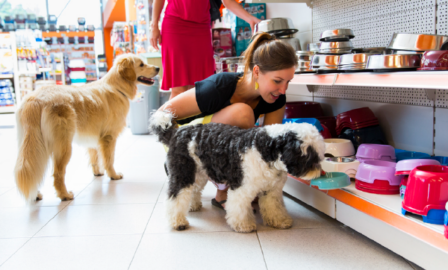Sustainability in Pet Care
As consumers continue to bring more pets home, sustainability in pet care has become an important topic. The pet food industry demand has grown and ultimately intensified its impact on the environment. A 2017 study approximated the carbon footprint of pet food to be 64 million tons per year in the U.S. alone (the equivalent of running roughly 16 coal fired power plants for a year). Especially with the rise of meat formulated pet diets, ingredient supply chains are emerging as a major threat. Meat production accounts for 65 percent of the world’s nitrous oxide, a gas with a global-warming impact significantly greater than carbon dioxide.
What’s more, consumers are noticing, and their expectations for transparency and environmental consciousness have risen. It is only a matter of time before consumers begin considering the environmental impact of their pets as they do for themselves, demanding more transparency. Pet care manufacturers must strive to put more on due diligence around how they can make a positive impact on the environment and surrounding communities in the years to come.
What are Organizations Getting Right on the Path to Sustainability?
Brand Experience Group research shows that an investment in sustainability is correlated with better performance in business growth metrics. Petco Health and Wellness Company, Inc. Is at the forefront of the revolution, dedicated to increasing its sustainable pet product assortment to 50% of all products by the end of 2025. Petco hosted its inaugural Sustainability Vendor Summit on Sept. 22 to connect its merchandising team with sustainable pet products.
Pet brands that do sustainability right take an informed, data-driven approach to goal setting and programming for sustainability in pet care. This positions them for sustainable business growth, market share advancement, reputation enhancement, deeper consumer relevance and advocacy, and greater marketplace competitive leverage.
Reduce Waste through Recyclable Packaging
Mars Petcare, working towards its goal of 100% recyclable packaging by 2025, is set to replace shrink-film with cardboard across its UK multipack pet food range. The move is the company’s latest commitment to circularity, following an announcement in July of a recycling program with Pets at Home which involves dedicated in-store recycling points for pet food packaging introduced across 40 UK stores. To make progress in the packaging space, manufacturers need to determine what opportunities they have to reduce use of plastic or how they can partner with initiatives such as The Flex Forward initiative to recycle materials.
Minimize Use of Plastic in Toy & Accessory Manufacturing
Most pet toys still have a long way to go. Many dog toys are made of plastic, which can be both harmful to the dog’s health and also to the environment. Natural rubber can surprisingly be more sustainable because no deforestation takes place in its production process, only using rubber trees for their sap (latex). The sourcing process should not be overlooked when considering the environment and the pet’s health. Further, toys made with hemp, such as ropes, are a great option because they do not leave any toxins behind and are sourced from natural products that do not use pesticides.
Maximize Use of Natural Environment & By-Products
Becoming more sustainable takes on a variety of different forms. In some ways, it can even be utilizing the natural environment to the maximum; it was recently discovered that water buffalo by-products including horns, lungs, and udders, can serve as dog treats and chews. These parts are otherwise discarded, so giving them another life helps promote a circular economy – a cycle of evolving inputs and outputs that ensures nothing new created is wasted at the end of its life.
Two other less common product ingredients are bamboo and rice husk, which both have a positive impact on the environment. Bamboo is a carbon dioxide absorber, releasing more oxygen into the air in comparison to that of trees, while rice husk breaks down into a fertilizing material.
Looking into the Future of Sustainability in Pet Care
Pay Attention to Legal Mandates on Labelling
Not only are sustainable pet products an imperative among consumers, but they are becoming mandatory by state governments as well. Particularly in California, several greenwashing cases are being settled involving the incorrect labeling of pet waste bags as ‘eco-friendly’. Filings across major pet care retailers surpassed $1.7 million in early 2021.Manufacturers should pay attention to the processing of products equally as much as they do to marketing to stay in line with regulations and consumer expectations.
Be Mindful of Continued Private Label Brand Growth
As the pet food and accessory market continues to become more saturated, manufacturers need to seize the opportunity to curate sustainable products from concept to delivery. We see prominent retailers like Chewy, Petco, and Target releasing their own private label brands or services which cater to the sustainably conscious consumer. For example, Target recently announced the launch of its’ new sustainable pet food brand, Kindfull. The brand’s ingredients include poultry, pasture-raised beef and fish caught through sustainable means, and over 40% of the brands’ products use recyclable packaging.
As retailers spin up new brands, manufacturers large and small should identify how they set themselves apart with a purpose-driven reputation. Building a consistent, clear position on sustainability across environmental, social, economic pillars poises organizations to make more meaningful decisions on their impact on sustainability in pet care into the future.
Subscribe to Clarkston's Insights
Contributions by Alexandra Hatsios



